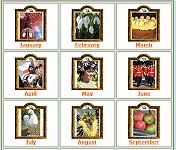
Folklore Calendar
stories, sayings, customs

Facts about October Gemstone: Opal |
|||||||||||||||||||||||||||||||||||||||||||||||||||||||||||||||||||||||||||
|
In the old Roman calendars, October was the eighth month of the year and got its name from the word 'Octo' meaning eight. The Saxons called it Wyn Monath because it was the season of wine making.
During October, the leaves begin to change colour, transforming England’s landscape into an array of autumn colours.
In Hampshire, in the eighteenth century, a Mr William Davis was riding home when a heavy fog surrounded him, and in no time at all he found that he had lost his way. Suddenly, he heard the bells from his church start to ring, so he followed the sound and arrived safely home. Later on he worked out that he must have been only a few yards away from chalk pits, where the ground had been dug deeply. Had he gone any further, he would have been killed. When Mr Davis died in 1754, he left some money in his will. The money was to pay the bellringers to ring the church bells at 6:30 a.m. and 7 p.m. on 7th October every year, to help travellers find their direction should they get lost on the same night he had been lost.
After the calendar reform of 1752, some activities traditionally associated with Michaelmas Day (29 September) moved forward eleven days to 10 October, which is sometimes called 'Old Michaelmas Day'. Mop Fairs or Hiring Fairs took place on an around Michaelmas Day.
Michaelmas used to be the time for 'Mop' or Hiring Fairs. Servants and farm labourers would work from October to October and then go to the centre of the village or town to hire themselves out again for the next year. People looking for work would dress in their best clothes, and to let people know what work they wanted, they used to wear or carry some sign of their work. Maids, looking for work, would carry a small mop (that's where we get the name Mop Fairs from), a shepherd had wool,a gardener had flowers and so on. The new masters and mistresses would walk around the fair and talk to the people. When they had come to an agreement, they gave the servant a small token - maybe something like 5p. The servant would then remove the sign of his job and replace it with a bunch of brightly coloured ribbons to let everyone else know that he had been hired. Mop Fairs Today The custom remains today in some towns and villages around the country. Several towns in Warwickshire enjoy the spectacle and the fun from the holding of the annual mop fair.
Traditionally a day when girls could have some insight into their future marriage prospects. Before going to bed they must put on their faces a mixture of spices, honey and vinegar, and once in bed they must say the following rhyme:
Dog Whipping Day St Luke's Day is also know as Dog Whipping Day, when all the stray dogs in the streets had to be whipped out of town. St Luke's Little Summer St Luke's day is often at the centre of a spell of particularly fine weather known as St Luke's Little Summer.
Traditionally this was the date on which the English pudding season started. These were filled with steak, leaks, mushrooms, spices and some were cooked for as long as sixteen hours.
In the days before the idea of migration was understood, this seemed a reasonable explanation for their sudden disappearance. The fact that swallows skim the surface of ponds for insects may have been the starting point for this particular folklore.
Some time in the Middle Ages, all the men of Hinto St George went off to a fair. When they failed to return that evening, the women went looking for them by the light of punkies. Punky is another name for a pumpkin which has been hollowed out and has a candle standing inside it. Traditionally on this night, children in the South of England would carve their ‘Punkies’, (pumpkins) into Jack O'Lanterns. Once carved the children would go out in groups and march through the streets, singing traditional ‘punky’ songs, calling in at friendly houses and competing for best lantern with rival groups they meet. The streets would be lit with the light of the Punkies. Nowadays, on Punky Night in Hinton St George, Somerset, local children join a procession through the village streets, swinging their homemade lanterns and going house to house, singing traditional ‘punky’ songs and sometimes getting a few pennies at the front door.
On October 31st, we celebrate Halloween,
Jan | Feb | Mar | Apr | May | Jun | Jul | Aug | Sept | Oct | Nov | Dec
|
|||||||||||||||||||||||||||||||||||||||||||||||||||||||||||||||||||||||||||
 © Copyright - please read © Copyright - please read All the materials on these pages are free for homework and classroom use only. You may not redistribute, sell or place the content of this page on any other website or blog without written permission from the Mandy Barrow. |
© Copyright Mandy Barrow 2013
Mandy is the creator of the Woodlands Resources section of the Woodlands Junior website.
The two websites projectbritain.com and primaryhomeworkhelp.co.uk are the new homes for the Woodlands Resources.
Mandy left Woodlands in 2003 to work in Kent schools as an ICT Consulatant.
She now teaches computers at The Granville School and St. John's Primary School in Sevenoaks Kent.
Woodlands Junior Homework Help new website


 On St Francis Day swallows are supposed to fly to the bottom of ponds and hibernate through the winter.
On St Francis Day swallows are supposed to fly to the bottom of ponds and hibernate through the winter.  Punky Night falls on the last Thursday in October and is a Somerset tradition.
Punky Night falls on the last Thursday in October and is a Somerset tradition. 




